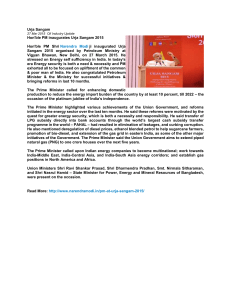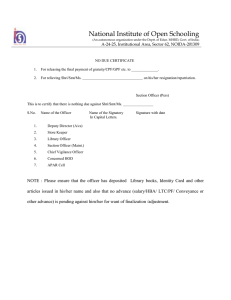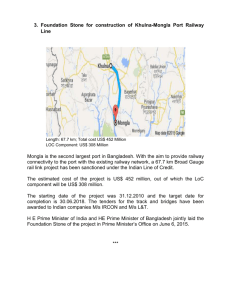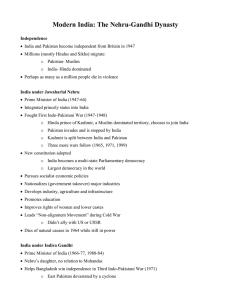Prime Ministers of India
advertisement
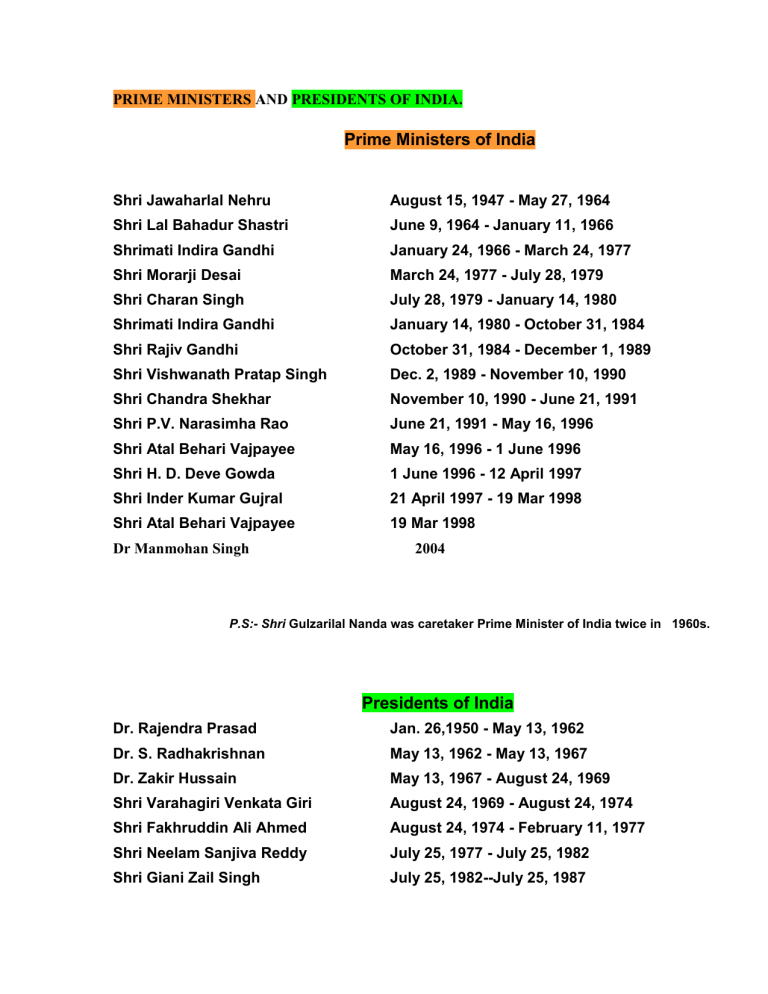
PRIME MINISTERS AND PRESIDENTS OF INDIA. Prime Ministers of India Shri Jawaharlal Nehru August 15, 1947 - May 27, 1964 Shri Lal Bahadur Shastri June 9, 1964 - January 11, 1966 Shrimati Indira Gandhi January 24, 1966 - March 24, 1977 Shri Morarji Desai March 24, 1977 - July 28, 1979 Shri Charan Singh July 28, 1979 - January 14, 1980 Shrimati Indira Gandhi January 14, 1980 - October 31, 1984 Shri Rajiv Gandhi October 31, 1984 - December 1, 1989 Shri Vishwanath Pratap Singh Dec. 2, 1989 - November 10, 1990 Shri Chandra Shekhar November 10, 1990 - June 21, 1991 Shri P.V. Narasimha Rao June 21, 1991 - May 16, 1996 Shri Atal Behari Vajpayee May 16, 1996 - 1 June 1996 Shri H. D. Deve Gowda 1 June 1996 - 12 April 1997 Shri Inder Kumar Gujral 21 April 1997 - 19 Mar 1998 Shri Atal Behari Vajpayee 19 Mar 1998 Dr Manmohan Singh 2004 P.S:- Shri Gulzarilal Nanda was caretaker Prime Minister of India twice in 1960s. Presidents of India Dr. Rajendra Prasad Jan. 26,1950 - May 13, 1962 Dr. S. Radhakrishnan May 13, 1962 - May 13, 1967 Dr. Zakir Hussain May 13, 1967 - August 24, 1969 Shri Varahagiri Venkata Giri August 24, 1969 - August 24, 1974 Shri Fakhruddin Ali Ahmed August 24, 1974 - February 11, 1977 Shri Neelam Sanjiva Reddy July 25, 1977 - July 25, 1982 Shri Giani Zail Singh July 25, 1982--July 25, 1987 Shri R. Venkataraman July 25, 1987- July 25, 1992 Dr.S.D. Sharma July 25, 1992 - July 25, 1997 Shri K R Narayanan July 25, 1997 - 2002 Description Period ANCIENT EMPIRES ca. 2500-1600 B.C. Indus Valley culture. ca. 1500-500 B.C. Migrations of Aryan-speaking tribes; the Vedic Age. ca. 1000 B.C. Settlement of Bengal by Dravidian-speaking peoples. ca. 563-ca. 483 B.C. Life of Siddartha Gautama--the Buddha; founding of Buddhism. ca. 326-184 B.C. Mauryan Empire; reign of Ashoka (269-232 B.C.); spread of Buddhism. ca. 180 B.C.-A.D. 150 Shaka dynasties in Indus Valley. ca. A.D. 320-550 Gupta Empire; classical age in North India. 606-47 North Indian empire of Harsha. 711 Arab invaders conquer Sindh, establish Islamic presence in India. 750-1150 Pala Dynasty. 1150-1202 Sena Dynasty. GROWTH OF ISLAM 997-1027 Mahmud of Ghazni raids Indian subcontinent from Afghanistan. 1202 Turkish conquerors defeat Sena Dynasty and overrun Bengal. 1206-1398 Delhi Sultanate. 1398 Timur sacks Delhi. 1414-50 Sayyid Dynasty; renewal of Delhi Sultanate. 1451-1526 Lodi Dynasty. THE MUGHAL PERIOD 1526 Babur lays foundation of Mughal Empire; wins First Battle of Panipat. 1556-1605 Akbar expands and reforms the empire; Mughals win Second Battle of Panipat. 1605-27 Reign of Jahangir; in 1612 East India Company opens first trading post (factory). 1628-58 Reign of Shah Jahan. 1658-1707 Reign of Aurangzeb, last great Mughal ruler. 1707-1858 Lesser emperors; decline of the Mughal Empire. BRITISH PERIOD 1757 Battle of Plassey--British victory over Mughal forces in Bengal; British rule in India begins. 1835 Institution of British education and other reform measures. 1857-58 Revolt of Indian sepoys (soldiers) against East India Company. 1858 East India Company dissolved; rule of India under the British crown--the British Raj--begins with Government of India Act; formal end of Mughal Empire. 1885 Indian National Congress (Congress) formed. 1905 Partition of Bengal into separate provinces of Eastern Bengal and Assam, West Bengal. 1906 All-India Muslim League (Muslim League) founded. 1909 Morley-Minto Reforms; separate electorates for Muslims. 1912 Partition of Bengal annulled; new province of Bihar and Orissa formed; plans to move capital from Calcutta to Delhi announced. 1916 Congress-League Scheme of Reforms (often referred to as Lucknow Pact) signed. 1919 Montagu-Chelmsford Reforms; Government of India Act. 1935 Government of India Act of 1935. 1940 Muslim League adopts Lahore Resolution; "Two Nations" theory articulated by Muslim League leader Mohammad Ali Jinnah and others. August 16, 1946 "Direct Action Day" of Muslim League. INDEPENDENT INDIA August 15, 1947 Partition of British India; India achieves independence and incorporates West Bengal and Assam; Jawaharlal Nehru becomes prime minister of India. Pakistan is created and incorporates East Bengal (the East Wing, or East Pakistan) and territory in the northwest (the West Wing, or West Pakistan); Jinnah becomes governor general of Pakistan. August 15, 1947May 27, 1964 Jawaharlal Nehru serves as prime minister and leader of Congress-controlled government. October 22, 1947January 1, 1949 Undeclared war with Pakistan; ends with United Nationsarranged ceasefire. January 30, 1948 Mahatma Gandhi assassinated in New Delhi. October 20Border war with China. November 21, 1962 June 9, 1964January 11, 1966 Lal Bhadur Shastri serves as prime minister of Congress-led government. August 5-September Second war with Pakistan. 23, 1965 January 24, 1966March 24, 1977 Indira Gandhi serves as prime minister for first time, head of government initially led by Congress, later Congress (R). December 3-16, 1971 Third war with Pakistan; Bangladesh becomes independent following Indian invasion of East Pakistan. June 25, 1975January 18, 1977 State of Emergency proclaimed by Indira Gandhi. March 24, 1977July 28, 1979 Morarji Desai serves as prime minister as head of a multiparty front, Janata Party, India's first non-Congress government. July 28, 1979January 14, 1980 Chaudhury Charan Singh serves as prime minister as head of a Janata-led coalition government. January 14, 1980October 31, 1984 Indira Ganhdi serves as prime minister for second time, head of Congress (I) government. October 31, 1984 Indira Gandhi assassinated in New Delhi. October 31, 1984December 2, 1989 Rajiv Gandhi serves as prime minister of Congress (I)-led government. December 2, 1989November 7, 1990 Vishwanath Pratap Singh serves as prime minister of National Front-led coalition government. November 10, 1990- Chandra Shekhar serves as prime minister, heading June 20, 1991 Samajwadi Janata Party government. May 21, 1991 Rajiv Gandhi assassinated near Madras. June 20, 1991-May P.V. Narasimha Rao serves as prime minister of Congress 15, 1996 (I)-led government. December 6, 1992 Babri Masjid in Ayodhya, Uttar Pradesh, destroyed by Hindu activists. Communal violence in wake of Babri Masjid destruction January-March 1993 wracks Indian cities, especially Bombay, which suffered from a series of bomb blasts in March. May 1995 Unpopular Terrorist and Disruptive Activities (Prevention) Act of 1985 allowed to lapse April 27-May 7, 1996 General elections for Lok Sabha oust Congress (I) government of P.V. Narasimha Rao. May 15-28, 1996 Minority Bharatiya Janata Party (BJP) government led by Prime Minister Atal Bihari Vajpayee resigns after thirteen days. June 1, 1996 Haradanahalli (H.D.) Deve Gowda, head of thirteen-party United Front, sworn in as India's eleventh prime minister. Rabindranath Tagore (1861 - 1941) Nobel Prize for Literature (1913) Sir C.V. Raman (Chandrasekhara Venkata Raman)(1888 - 1970) Nobel Prize for Physics (1930) RAMAN" effect which fetched him the Noble Prize in 1930. He was the first Asian scientist to win the Nobel Prize. The Raman effect occurs when a ray of incident light excites a molecule in the sample, which subsequently scatters the light. While most of this scattered light is of the same wavelength as the incident light, state (i.e. getting the molecule to vibrate). The Raman effect is useful in the study of molecular energy levels, structure development, and multi component qualitative analysis. Dr. Hargobind Khorana Nobel Prize for Medicine and Physiology (1968) Mother Teresa (1910 - 1997) Nobel Prize for peace (1979) Dr. Amartya Sen Nobel Prize for Economics (1998) Rudyard Kipling (1865-1936) V.S. Naipaul (1932- ) States, U.T and Capitals of India States and Union Territory Capital Andaman & Nicobar Islands Port Blair Andhra Pradesh Hyderabad Arunachal Pradesh Itanagar Assam Dispur Bihar Patna Chandigarh Chandigarh Chhatisgarh Raipur Dadra & Nagar Haveli Silvasa Daman & Diu Daman Delhi Delhi Goa Panaji Gujarat Gandhinagar Haryana Chandigarh Himachal Pradesh Shimla Jammu & Kashmir Srinagar (Summer), Jammu (Winter) Jharkhand Ranchi Karnataka Bangalore Kerala Thiruvananthapuram Lakshadweep Kavaratti Madhya Pradesh Bhopal Maharashtra Mumbai Manipur Imphal Meghalaya Shillong Mizoram Aizawl Nagaland Kohima Orissa Bhubaneswar Pondicherry Pondicherry Punjab Chandigarh Rajasthan Jaipur Sikkim Gangtok Tamil Nadu Chennai Tripura Agartala Uttar Pradesh Lucknow Uttaranchal Dehradun West Bengal Kolkata FREEDOM FIGHTERS Gandhiji Gandhiji's life was dedicated to the ideals of Truth, Nonviolence and Love. He was the architect of India's freedomand one of the greatest men of this century Sardar Patel India's Man of Steel. He gave up his practise in order to fight for the freedom of the country. He was sent to prision. As the Deputy Prime Minister of free India, he became the architect of the integrity of India by merging of hundreds of princely states with the Indian Union. Bal Gangadhar Tilak Ramaprasad Bismil "Swaraj is our brithright" thundered Tilak, the Lion of A Brave revolutionary who up his life smilingly for the India. He founded schools sake of the Motherland. He was hunted by the police and published newspapers all and betrayed by fellow workers. He was the brave leader for his motherland. He wore of Kakori Rail Dacoity Episode. him- self out till his last breath, to awaken his countrymen. Bhagath Singh Khudiram Bose He is the symbol of the heroism of the youth of India. A revolutionary. He threw a It was this hero who threw te first bomb on the Bristish bomb when the Legislature who were crushing India. The boy of sixteen defied the was in session, to warn the police. At the age of nineteen,hebecame a martyr, wiht British Government. He was the holy book the Bhagavadgita ( The Divine Song) in put to death but lives in the his hand and with the slogan ' Vande Mataram' on his hearts of his countrymen. lips. Tatia Tope Ashfaqulla Khan A hero of the fight for freedom in 1857. His very name made The pathan patriot who kissed the hangman's noose the mighty English generals wiht the name of Allah on his lips. A youth endowed with tremble. Deceived by his a body of iron and will of steel, he dedicated everything friend, he faced death like a to the service of India and of freedom and challenged hero, for the sake of his the cunning and the strength of an empire. country. Madame Cama The fiery patriot who first unfurled India's flag at an international assembly. She turned away from a life of luxury and lived an exile - to serve her country. And the mighty British Government grew afraid of her. Great Scientists Dr.C.V.Raman The Genius who won the Nobel prize for Physics, with simple equipment barely worth Rs.300. He was the first Asian scientist to win the Nobel Prize. He won honour as a scientist and affection as a teacher and a man Homi Bhabha The architect of Nuclear Science in Modern India. He was a painterand worshipped the beauty of Nature.Science and art both enriched his mind an life. He was the ideal personality India needs today Vikrama Sarabhai One of the greatest scientists of India. As Chairman of the Atomic Energy Commission, he guided research of the greatest improtance to the country. A born scientist and a beloved teacher. Dr.J.C.Bose The great biologist who showed that plants, too can 'feel' in their own way. He saved money ;he bought a small laboratory and build his equipment; and scientists in Euorpe and Sathyendranath Bose A renowned Indian scientist. He developed a new branch of physics. He worked with Albert Einstein, Madame Curie and other scientists of world renown. America wondered at his discoveries. Dr.P.C.Ray An Indian Scientist who won fame in many countries. Eighty years ago he began the manufacture of medicines in India. A Great teacher, he gave his salary to students interested in science. Birbal Sahani A Great scientist who lived only for knowledge. He declined high posts. He was a genius who shone in several spheres. He was a great teacher and a great man. Great Poets Tulasidas Kalidas The great poet who composed the 'Ramacharita- One of the greatise poets and dramatists in sanskrit. His chronicle of the manasa' His boyhood was in kings of the Raghy clan ( Rughuvamsha) the greatplay 'shakuntala' and poverty and suffering;but yet other works . he became a great scholar. Bankim Chandra Namadeva One of the greatest novelists of India who gave the poeple Namadeva who lived during the end of the 13th century is one of the best the scared mantra - Vande known saint poets. Namadeva lived in Constant communion with lord Mataram' The begal Novel Panduranga. practically began with him. Tenali Ramakrishna Maharshi Valmiki A Poor orphan in his boyhood, he rose to be the favourite The Adikavi, the Poet of Poets, of India, who gave the world the immortal adviser of powerful king. A epic, the 'Ramayana'. By Profession a highway robber, he came under the Scholar and a poet, he spell of Maharshi Narada and became a 'Brahmarshi'. exposed superstition and stupid pride ot ridicule Great Leaders Lal Bahadur Shastri Lal Bahadur proved to be one of the heroes of the history of India. A Great general in Gandhiji's Army of peaceful soldiers of freedom. He became the symbol of India'svalour and self-respect Motilal Nehru A boyhood of poverty. In later life wealth, luzury and pomp as that princes could not match. And then in later life, a great leader of India's fight for freedom. Motilal went to prison too. His son was Jawaharlal Nehru. Rajaji A leader gifted with amazing intellectual brilliance. He gave up his lucrative law practice for the sake of Lala Lajpat Rai A Great national leader who came to be called the 'Lion of punjab.' Worked tirelessly to improve education, to promote unity among Hindus and to reform society. Dr. B.R. Ambedkar Born in a class considered low and outcaste, he fought untiringly for the down trodden.The boy who suffered bitter humiliation became the first Minister for Law in free India, and shaped the country's Constitution. M.S. Golwalkar He was well known as ' Guruji' throughout Bharat, and was the second Sarsanghchalak of Rashtriya the country. He was at once a child of Indian culture Swayamsevak Sangh. His life was wholly dedicated and a citizen of the world. tot he service of the motherland. GREAT PERSONALITIES Savithri Draupadi She chose a noble young man for her husband. She The wife of the great Pandavas. renowned alike for knew he had only a year to live, but yet she married her loveliness and her granite will. Volcanic, she him. Even the God of Death bowed to her love and reduced her enemies to the ashes. But her story is a devotion and restored her husband to life. saga of suffering. Ekalavya Sister Nivedita A Student's distinction lies in his devout pursuit of know- ledge, and not merely in his heritage. This Young Margaret Noble came under the spell of manifests in a splendid manner in Ekalavya's life. He Swami Vivekananda. She came from distant Ireland worshipped an idol of his 'Guru' mastered archery. to India to serve the people of this land. She was when his master desired his right thumb as fee,he give the name of ' Nivedita' as one dedicated to God. smilingly sacrificed it. Raja Rammohan Roy Rammanohar Lohia Raja Rammohan Roy has come to be called the ' The Socialist leader of a fearless and dynamic Maker of Modern India'. With out giving up what was personality. Both before independence and in free good and noble in the past he laid the foundations India he went to prison several times for the sake of for a great future. HE was a great scholar and a the people. independent thinker. Madhanlal Dhingra Veer Abhimanyu The matchless youth who won immortality by his Dhingra died young but his life was one of the shining heroism in the great Mahabharatha war. heroism and glory. In London, the heart of the British Pitted against the mightiest of the mighty in the Empire, he killed an enemy of India. He died gladly enemies' ranks, this warrior barely sixteen became for his country. sheet anchor of the Pandavas. Lakshmana Karna Younger brother of Sri Rama, Lakshmana A Great Hero of hte 'Mahabharata'. Karna lived such personifies brotherly love and self - effacement. a life that he became another name for generosity When Sri Rama had to wage war against Ravana to and loyalty. It was his misfortune to be shunned as a rescue Sita, he whole heartedly collaborated in hte person of low caste. He sacrifice his life for his venture. master. Dr.Ananda K.Coomaraswamy Madana Mohana Malaviya Ananda K. Coomaraswamy who was born in Ceylon The founder of Benaras Hindu University. His ( Sri Lanka ) and grew up in England, taught the boyhood was spent in utter poverty. By his west the way to approach and understand the arts of scholarship, pure life and selflessness he won such India. His whole life was dedicated to the study and respect that he collected more that thirteen million exposition of Indian culture. rupees for the university. Dr.M.Visvesvaraya Bhishma One of the most honoured figures of the Indian epic, One of the makers of modern India. 'MV" was a the Mhabharata. He gave up marriage and throne genius. Perfectly honest and devoted to his work, for his father's sake. To the people of India he is the he set new standards of efficiency. symbol of mature wisdom. Dadheechi Bhargiratha Dadheechi after acquiring spiritual knowledge, led a Thegreat hero who brought down the Ganga from pious life. When prayed for by Indra and other gods, the heaven to the earth. Bhagiratha has become he readily sacrificed his life as well as body, in order another name for a will of steel that never accepts that the gods might win in their war against demons. defeat. Vidura Dhondo Keshava Karve A Great man who shines even in the galaxy of the Maharshi Karve lived for a hundred and four years. mighty characters of the ' Mahabharata'. Affection After he completed his education he pledged his life did not dim his wisdom. Fearlessly he walked the to the service to others. He chose poverty and path of righteousness. He showed the same pathe to walked the pathe strewn wiht criticism and others. opposition. Bahubali Nandalal Bose Bahubali defeated his elder brother who was puffed A Celebrated painter of modern India. A genius who up with pride, but at that very moment understood was admired in many countries. His was an his life's aim. He gave back the kingdom to his attractive personaity, which combined boundless defeated brother and went away to meditate the learning and a unique genius with unaffected God. He enriched the lives of his fellowmen with the modesty and gentle humour. light he received. Lava-Kusha Keshava Baliram Hedgewar Sons of Rama and Sita. After Rama sent away sita Founder of Rashtriya Swayamsevak Sangh. His who was pregnant, to the forest the twin children strong desire was that all the people should dedicate were born to her in the hermitage of sage Valmiki. themselves for the service of the Motherland Lava and kusha ties the horse of Rama and forgetting the differences of caste creed. etc He successfully fought Bharata, Lakshmana and Rama shone simple and loving personality. himself. At last are finally reunited with Rama. Jijabai Chanakya The mother of Shivaji who was the protector of the He vowed to dethrone the haughty king who was country as well religion. She was the embodiment of harassing the people of the land. His 'Arthashastra' self - respect. That great mother suffered in silence is a classic of statecraft and is reverently studied in and became a source of inspiration to her heroic son Europe and else where.
